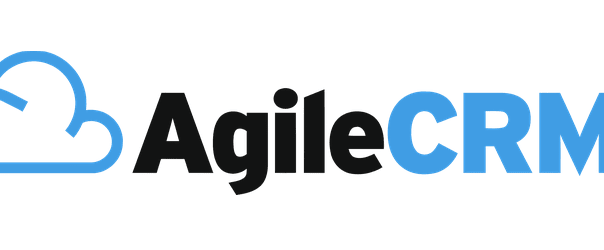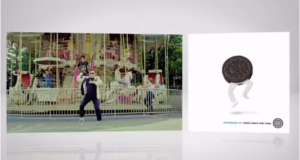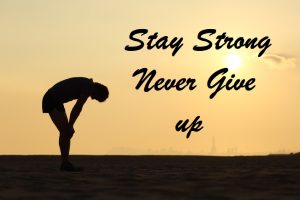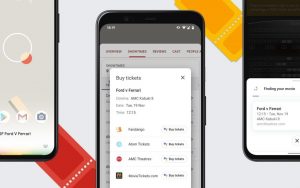— February 6, 2018

Still looking for a great web designer or agency for your new website?
After the great success of part 1, we’re happy to share with you the second part of our 60 questions post.
In fact, part 1 of our questions and answers is currently in the top 3 most popular posts in our entire blog, so you can be sure these other 30 questions and answers will provide even more value if your’e considering hiring a new website developer or marketing agency for your business or organization. If you haven’t read part 1, don’t worry you can read it before or after this post.
The reason these questions work, is after 15 years of experience in building websites, I’ve gotten to understand what business owners not only want but need in a company website. These 60 questions will guide you through the foundations of building a website so you can ask the appropriate questions, get the answers you really need to hire the right web designer or agency for you, and sound smarter while doing so!
The questions are divided into six categories:
Part 1 was covered in a previous post that you can read here.
It includes questions to learn more about your specific website project, the process the web designer will follow, and your website maintenance options.
- Web Design Project Details, Deliverables & Items to Consider
- Web Design Process
- Web Design Maintenance
Part 2 is covered in this post.
It includes more techinical and referential questions to get to know the web designer’s experience and knowledge.
- Web Design Skills & Experience
- Web Design Inspiration
- Web Design Tools & Resources
Let’s dive in!
Web Design Skills & Experience
Questions you should ask to explore your web designer’s or web agency’s depth of web design experience.
31. Can you provide examples of websites you’ve designed? Any of them within my industry?
This is perhaps one of the most popular questions people ask before choosing which web designer to work with. Naturally, as a potential client, you should request to see examples of your designer’s past work to help you get an idea of the quality and style of web design work that you should expect to get if you choose to decide to work with that designer.
Although it may seem strange to many of you, it’s very common that many freelance web designers don’t actually have a website of their own. If you ask to get examples, you might just get a list of links to various websites, instead of a link to the designer’s website or portfolio. If you’re looking into hiring a professional web design agency, then for sure expect to see their web portfolio on their company’s website. Always ask for at least 3 to 5 of their best web design examples.
32. How many years have you been doing website design?
This is pretty straight forward, a simple number of years will give you an idea of how long they’ve been doing web design. Feel free to ask details of how they got started, what inspired them to get into the industry, and what keeps them interested in staying in this field. The answers will let you know if they’re into web design just as a hobby, as their full-time job, etc.
33. How did you learn to build websites? Physical school, online courses or on your own?
This is a fair question, but something people don’t normally ask. Knowing whether your potential web designer learned to develop websites on his own through self-learning online and trial an error, or went to school for it in a physical campus (with other students, homework, etc), or just took an online certification; will open a window to their real motivators for learning web design. I for example, began building websites at the age of 17 during high school. I learned on my own by reading lots of online tutorials, and spent countless hours building websites for fun personal projects. This is the story of many others too, but not all. Getting to know your designer better will show whether he/she is more of a creative person, analytical person, or a mix of both.
34. How many websites have you developed?
In this industry, this is another way to check how experienced a freelance web designer or web design agency really is. Usually the more websites they’ve created, they better they probably are at what they do. Yet, that’s not always the case. Designing 100 crappy sites versus 10 high-end, high-quality websites makes a big difference. So don’t just ask how many, but also be sure they show you examples of what type of websites they’ve built in the past.
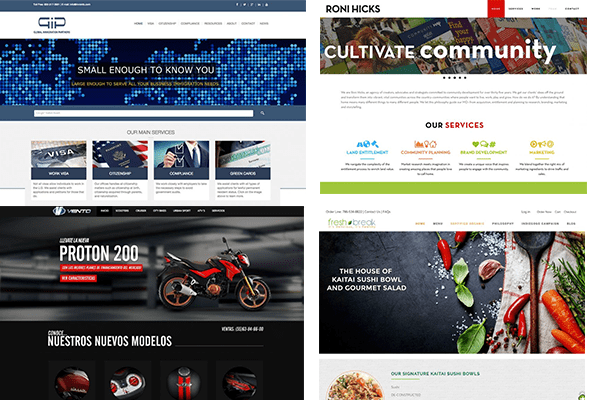
35. Are you mainly a web designer, web developer, or both?
You might not even know what the difference between a web designer and a web developer is. So here’s the short answer: A web designer’s job is focused on how the website looks, while a web developer’s job is focused on how it works (the backend code that makes it operate like a software program).
A website designer is responsible for designing the graphics, how elements are positioned on the page, selecting the right images, choosing great icons, selecting the right combination of colors, etc. While the web developer is in charge of making sure the site’s features work as expected, such as making sure a page loads correctly, the right web page loads when you click, animations appear as needed, etc.
For simple projects, a web designer may be enough for a brochure-style website that mainly has static information. While for complex websites with lots of functionality, you’ll need a web developer, as these sites are really considered to be software programs. These sites are now simply web-based programs, instead of being installed on your computer, but they’re much more than a simple information website.
Consider that some web designer originally started as graphic designers, whom then studied web design. Some the other way around, and some are strictly web developers (which tend to have limited creativity when it comes to design).
36. What type of graphic design experience do you have for web design?
As explained in the last question, a web designer is mostly a graphic designer who puts together written and visual content to be easily digested online through a web page on the Internet. Thus, if you’re looking for a cutting-edge or super high-quality design for your website, be sure your graphic designer or agency actually has a solid foundation in graphic design. If you study how a website is actually put together, it’s nothing more than a bunch of text and images (and now videos) shown on a page. So good web designers are also talented graphic designers by nature, and understand important design and composition concepts.
37. What’s your weakest skill within the web design world?
Maybe it’s a trick question, but I think it may be important to ask your future designer. Just like a job interview, asking that person what they’re NOT good at, is a good way to test their character, personality, and understand who they are as a person – not just as a designer. No one can be good at everything, and deep inside everyone knows what they’re not the best at doing. Figure out what that might be from your web designer/agency, and maybe it will help you decide whether to hire him/her/them or not.
38. Have you created similar websites for others in my industry?
Experience in any job is one of the most important factors to measure future success. If you’re interested in measuring the likeliness that your web design team will truly understand your business, your goals, your weaknesses, and your opportunities for growth; find out if they’ve developed similar websites for other companies in your industry. If they haven’t, they may still do a great job in creating your website, but you might just need to invest more time in teaching them about what your company represents and offers to your clients.
39. Do you specialize in designing websites for one specific type of company or industry?
Some web designers build websites for any company regardless of their industry, while other designers or web agencies only develop sites for a super targeted and specific type of customers. For example, there are web companies that only build websites for real estate companies, while others just for lawyers or accountants. If your business is in a highly competitive marketplace, it may be best that you choose a designer that specializes in your industry, as it is more likely that they have more experience. The downfall of course, is that your website might not look as unique as you might have wished.
40. What programming framework or coding language do you prefer to use?
Today’s websites are built with a variety of coding languages and frameworks. To you and most of your website visitors, the type of code or framework used will never really matter as long as the web page loads fast, and works as expected.
Yet, if you have any interest in connecting your website with additional web-based software that will add features and functionality to your site, then you must make sure that your website is compatible with those other services. In plain terms, both your website and any 3rd party software should be able to “speak the same language” in order to make it easier to transfer information back and forth between them. This is a highly technical subject, but if you’re interested, be sure to ask your potential web designer about it.
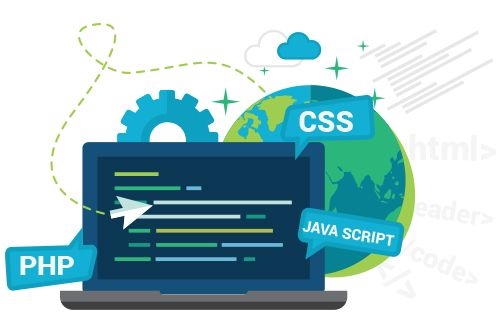
41. Do you know how to use the control panel of a shared hosting server, such as CPanel?
A website lives on a hosting server, which is a fancy name for a computer where your website files and images are stored. The server is a computer that’s connected to the internet, so that anyone in the world can see the content of your website when they type your domain.
There’re many types of hosting servers, with different types of administrator’s control panels. Be sure your website designer knows at least how to upload files to the server via FTP, can access a database, and can make adjustments to your server’s settings. For example, Bluehost’s cloud hosting service, which we recommend and set up for our San Diego web design projects, uses a software called “CPanel” that lets our team access and modify all of the components of the hosting service. Basic knowledge of using such a system is probably a good sign that you’ll be hiring an experienced designer or web design agency.
42. Do you know how to create, edit and manage databases, if yes what software do you use?
Long are the days when website were just made up of simple HTML code, the core of every web page on the Internet. Most modern website, including simple or complex small business websites built with WordPress or Joomla CMS all use some type of database. Any modern web designer should have at least basic knowledge of how a database works, so that if needed, they can edit the information on a database manually. The most popular user-friendly software to manage a database on shared hosting is called PHPMyAdmin. Ask your web designer if they know exactly what it is. If they don’t, it may not be a good sign.
Want to learn more? Read more about how a web page is loaded on your browser when visit a page, and you’ll have a better understanding of the importance of a database and database management.
43. Do you have any marketing experience, if yes, how do you integrate into your web design work?
So why do you want a website anyways, what is it really for? If you don’t know that, be sure to learn more about why websites are important for your business. If you do know the role that a website plays in your overall business, sales and marketing strategy, then be sure you find out how much your web designer or web design agency knows about marketing.
For the last few years, trends in web design have shifted towards making sure websites are used as lead generation machines that can attract and capture potential leads for your business. Building the right website for your small or medium business is not just about good looks, and functionality, but also about showing to your potential customers content that attracts their attention and encourages them to do business with your organization.

Web Design Inspiration
44. What are your top 3 favorite websites and why?
Every person is inspired by different things in life, and the same is true for web designers. Asking this question will give you a fantastic insight into the type of person your designer is, what type of design taste they have (minimal, modern, user-focused, etc), and much more. With this question, you get to ask about other websites the designer likes which are not his own. This forces them to show you additional work that they like, respect, and may use as inspiration for designing your future website.
45. In your opinion, what are the 3 most important parts of a website?
This question will help explain understand more about your designer’s level of expertise. Why? Because some designers who are just starting out may mention 3 things related to the website’s design itself, while other more experienced designers may mention things related to the website’s effectiveness as a sales tool. This may include how conversion-friendly it is in order to capture potential visitors and turn them into leads, as well as the user experience (UX) and user interface (UI) design. If the answers from your designer do not match some of the answers that are important to you, then that designer may not be a good match for your project.
46. Is there any particular web design style you prefer more than others?
Similar to the previous question, the answer to this question will help you as a customer understand the style of web design that your designer is most comfortable with. For example, some designers may answer that they like to mostly work with specific frameworks or CMS platforms such as WordPress or Joomla, while others will tell you that the most important part is to develop a custom website design from scratch using Photoshop. Others may answer that they prefer to focus on simply customizing existing website templates, rather than starting from scratch.

47. Where does your creative inspiration for web design come from? Have a process?
In the creative world, very few people have truly unique ideas. Most designers and creative people are always inspired by the work of others as part of their inspiration to design things. If you choose to ask this question, you may be pleasantly surprised to find out that some designers have access to numerous websites, tools or blogs that they often visit to learn about the latest trends in the web design industry. Others may have subscriptions to web design magazines, art magazines, or other publications that are always featuring the latest in web design.
Also be sure to ask if the designer has a specific creative process that he/she follows while building a website. Understanding how a designer thinks, and how they organize their work will give you a deeper insight into how they may build your next website.
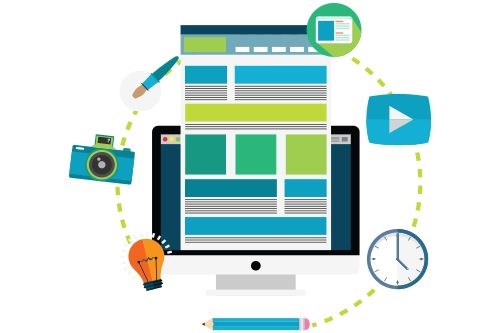
48. How often do you keep up with web design trends, technologies and tools?
This question is simple and straightforward, the goal is to get an idea about how often your potential web designer is looking at what’s happening in the web industry. Are there web design conventions that he/she’s aware of, any special new web tools that can be incorporated in web design? Be sure to ask for an example of the latest thing they’ve learned about what’s happening in the industry, or if there are any shifts you as the customer should be aware of.
49. What websites, blogs, forums, magazines or publications do you normally read?
If you’re interested in getting super specific about what inspires your next designer to stay on top of what’s happening in the web design world, feel free to ask this question. Truly passionate designers will easily spill out a list of things they’re constantly reading and learning about, while others may simply say nothing. There’s no correct answer, but by asking this question, you’ll get more information about specific things you might want to lookup on Google to get a better understanding of the future of web design and how it may affect your investment in your next website project.
50. Are there any new web design trends or skills you don’t know how to use yet?
This is a key question to test how much your designer not only knows, but more importantly what he/she doesn’t know. An important part of growing as a web designer, is to constantly be on the lookout for what’s changing, what’s successful and what’s not successful, and figuring out a way to adapt in order to continue to stay relevant in the industry. Experienced and well training designers will be able to easily tell you what skills they might be missing that they wish they had, or about new web trends that are up-and-coming but they haven’t implemented yet. There’s nothing wrong with not being up to speed with everything, but at least knowing about what you’re missing as a designer shows you that your designer is really focused and passionate about the work they do.
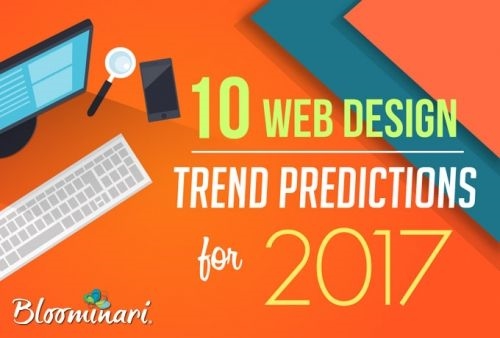
Web Design Tools & Resources
51. What content management system (CMS) are you planning on using, if any?
First, let me tell you what a CMS is. CMS stands for Content Management System, and you can think of it as the software that lets designers and customers to access, edit and manage their website from any browser. The same way that you can access G-mail from any device, a CMS enables you to access the administrative section of your website so that you can update it as necessary.
Not all websites need nor use a CMS platform, and if they don’t that’s totally ok. The main drawback is that if your website isn’t built on top of a popular CMS like WordPress, Joomla or Drupal, you’ll be very limited in your ability to expand and grow your website (Through the use of 3rd party apps and plugins), and you won’t be able to access and edit your website on the fly. To learn about the most popular CMS platforms, visit this web technology survey. If you have no idea, or care which CMS your designer uses, I can tell you that WordPress is the most popular, and Joomla is the second most popular.
52. Have you worked with other CMS, if yes which ones?
If you’re interested in building an informational website, e-commerce online store, or a combination of both, WordPress is a great option. If you’re interested in advanced website management features, Joomla is a great option as well. Despite the fact that your potential designer may only work with 1 or 2 platforms, it’s good to know if they are have experienced working with other CMS platforms. Other platforms may include Wix, Squarespace or Weebly for simpler sites or Magento, BigCommerce, or Shopify for e-Commerce specific websites.
53. Do you have access to a stock photography library? If yes, which one?
This question is similar to number 7 from part 1 of this post, but this question is about getting the specifics about what images your designer has access to. Choosing the appropriate images for your website will determine a big part of how beautiful your website will look, so investing in high-quality photos is super important. A unique image on your homepage may help your site look super unique, or look super typical and boring if the image is too typical. So ask your designer which specific photo libraries they use or have access to. There’re a lot of them, and the quality of the photos in terms of creativity – not just photo resolution – varies greatly.
A few of our favorite stock photography libraries
– 123rf – 85+ Million photos. High quality, and super affordable. As low as $ 0.75/photo. Starts around $ 1/credit.
– iStockPhoto – Millions of photos. Super high quality, mid to high range prices. Starts at around $ 33/photo.
– Shutterstock – 150+ Million photos. Great variety, affordable prices. Starts at around $ 15/photo.
– Dreamstime – 65+ Million photos. As low as $ 0.72/photo. Starts at around $ 1.50/credit.
– Fotolia – 98+ Million photos. Great variety, backed by Adobe. Starts around $ 1.50/credit.
Note: 1 credit usually refers to an extra-small, low resolution photo. For high resolution, print-quality, you may need to pay 3-10 credits, depending on the photo library.
54. Are the cost of the stock photos or videos included, or should we pay for them?
Now that you know what stock photo library your designer has access to, it’s time to find out who’ll be paying for the images – them or you? Depending on your project’s size and proposal, photos may or may not be included. If photos are included, be sure to ask how many photos you can choose and at what resolution they will be acquired (low quality for the website only, or high quality for optionally using in printed materials). If photos aren’t included, then you’ll have the freedom to browse, choose and purchase images as you see fit.
To give you an example, our San Diego website design agency always includes the cost of at least 5 high-resolution photos. Many more photos are included based on the size of the project. To keep costs low for our customers, our agency mostly uses 123RF as it’s stock photo library of choice.
55. Do you offer hosting services for the website? If not, which host do you recommend?
Not sure what a hosting service is? No problem, I’ll explain. Think of a hosting service as the physical space where your website lives, and you are required to pay rent to occupy that space. Hosting is the service of renting space on the hard drive of a computer that’s connected to the Internet to allow anyone to visit your website. Hosting services vary greatly in price and features, and can go as low as FREE (not recommended), to $ 5/month for simple shared hosting, all the way up to thousands of dollars.
If you’re having a website built on WordPress or Joomla, you’ll for sure need a separate hosting service, but if you are using a platform such as Wix, Squarespace, BigCommerce or Shopify, the hosting service cost is built into the monthly price you’re paying for using their software (Their CMS).
56. Is the domain name included, or should we buy it separately?
A domain is an essential part of your website, as it’s the URL that people will see once they login to your website. Domains start at about $ 1/year, or up to $ 35/year, depending on where you buy it. On average, you shouldn’t pay more than $ 15/year to own your domain.
If you haven’t purchased a domain yet, but you’re planning on building a website, go buy a domain as soon as possible – even before you contact web designers or web design agencies. A domain is inexpensive, and something you can buy on your own.
Yet, if you don’t want to do this, then be sure to ask your web designer or agency if they include the cost of a domain with the price of building your website. Most will probably include it. When purchasing domains on behalf of our San Diego or US based customers, we recommend using NameCheap.com or 1and1.com. Both platforms are secure and easy to use, but Namecheap is cheaper. That’s why we transferred all of our company domains to them this year (Why pay more?).
57. Will you integrate 3rd party apps, plugins, widgets or extensions on my website?
When building a website on WordPress or Joomla, the most common way to extend the functionality of your basic website is to integrate it with additional apps. Just like you download apps on your iPhone or Android phone, you can also download WordPress Plugins or Joomla Extensions for your website. Or also explore the BigCommerce App Store and Shopify App Store for expanding your e-commerce store.
Ask this question to your designer to learn about his familiarity with this topic. Feel free to also ask about the top 3 to 5 apps that he/she loves and is considering to integrate with your website. Keep in mind that some apps are free, but others cost money. Your investment in any of these apps will be totally worth every penny, so don’t ever think of not paying for an app or extensions. Your other option to request a custom website feature will require a web developer to custom-code an app just for you, and that’s going to cost you a lot more money.
58. Do you link to any external web-based tools, such as for appointments or e-commerce?
When it’s hard to find an app or extension you can install on your website for a specific feature you want, your best next option is to use and link to a 3rd party web-based app or tool instead. Ensure that you discuss this with your web designer if you have any special requirements for your website. To illustrate what I mean, allowe me give you an example.
Let’s say that you own a dog walking company, like our KK9 club customer, and you want your clients to use your website to book a time to have their pets walked. Ideally, you’d find an app for WordPress or Joomla that can be installed on your website, so customers can book appointments. In this case, you didn’t find the app you were looking for, so your next best option was to look for a web-based appointments tool that your customers can use. This appointment tool wouldn’t be installed on your website (such as on www.kk9club.com/bookings), but instead you’d link to it from your website to a page like www.dogwalkers.com/kk9club. Although this tool wouldn’t be on your site, that’s ok, as the functionality it offers makes it worth using and sending your customers to.
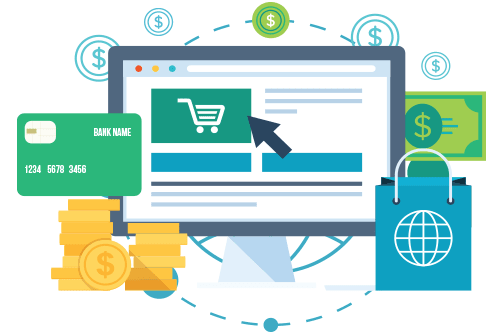
59. Do you integrate any web contact forms, or pop-ups to capture leads?
If you’re interested in using your website as a way to find and capture new potential clients (leads), then you’ll be interested in using some type of tool to make it easy for your web visitors to opt-in to learn more from you. Popular capture forms include a web form on a contact us page, as well as pop-ups asking for your visitors e-mail in exchange for some type of offer or valuable piece of content.
Although initially you might just need a simple contact us page, it’s important that you consider other ways to capture your visitor’s interest and turn them into potential clients. Discuss with your web designer or agency the various tools they use or recommend for your specific project. At our San Diego marketing agency, we use Sumo, and love how easy it is to create pop-ups to capture lead’s information. OptinMonster is another terrific lead capturing software you should consider.
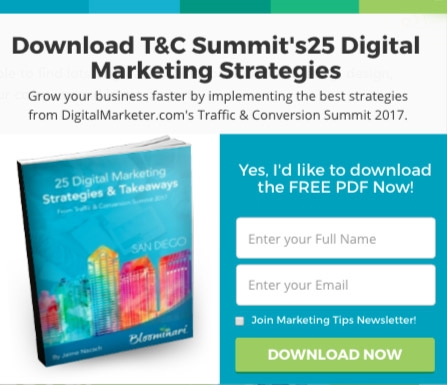
60. Do you integrate the website with E-mail marketing, a CRM or other marketing automation?
Last, but not least, is my favorite question to ask potential web designers or agencies to test how much they know about marketing and technology. Your website shouldn’t be just something you build and forget about. Instead it should be a live sales and marketing tool that you’re constantly updating with new content and information to help your potential customers learn more about you and your expertise.
Ask your web designer what type of E-mail marketing system he can integrate into your website to allow your visitors to sign-up to your newsletter or other e-mail list, or what CRM (customer relationship management system) they can integrate to automatically capture leads from your website and save them on your contacts database. Keep in mind that many modern web-based CRM systems now also offer marketing and sales automation. This means you as a business owner is able to setup sales and marketing workflows to automatically communicate with your users. At our agency, we use and recommend Agile CRM, a feature-rich system at a super affordable price. Starting at just $ 15/user/month.

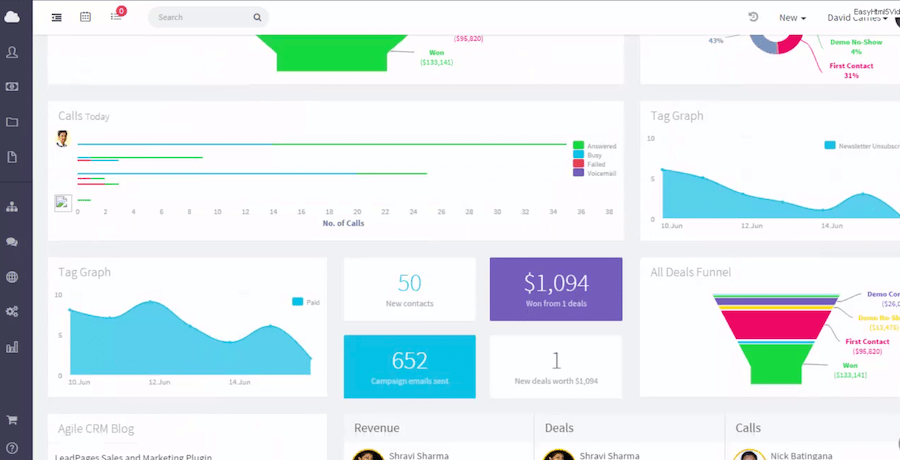
———
Ready to interview your next potential web designer?
I hope that the combined 60 questions from part 1 and part 2 of this post will help you find, evaluate and choose the best next web designer or web design agency for your project. Remember that as a potential customer, the more prepared you are and the better understanding you have about web design, the easier it will be to find and pick the right designer, and the higher the likeliness that your website project will be developed successfully and will meet your expectations.
Digital & Social Articles on Business 2 Community
(74)
